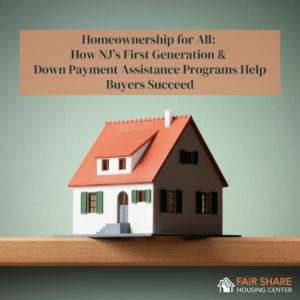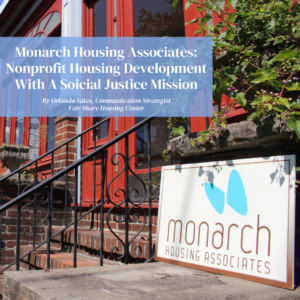The Racial History of Housing Discrimination and its Continued Effects in 2022
February 24th, 2022
By Cree Long, FSHC Communications and Development Intern
As Black History Month comes to an end, we are once again reminded of the historic connection between housing and race, and the origin story of our organization that is grounded in the power of engaged and organized communities. Our mission is to eliminate exclusionary zoning and housing patterns that prevent lower income and communities of color from residing in safe, affordable, and healthy homes. The Mount Laurel Doctrine, the series of Supreme Court decisions that prohibits economic discrimination by municipalities in exercising their land use powers, prioritizes space for affordable housing. The Doctrine fights against towns in New Jersey that used zoning as a tool to further exclude and oppress communities of color. Despite the extraordinary progress we’ve made in addressing exclusionary zoning in the nearly fifty years since we were founded, there is still much more work to do. Discriminatory policies of the past continue to perpetuate recurring, detrimental harms on communities of color, even today. Not only were these policies rooted in racism, but every level of government, especially in New Jersey, supported these mandates– making it impossible for Black and Brown families to generate wealth and live peacefully.
President Roosevelt signed the National Housing Act of 1934 in response to the most severe economic crisis in our nation’s history, the Great Depression. The Act provided the American homeowner with improved “housing standards and conditions,” initiatives like the 30 Year Fixed Mortgage Rate, and low, fixed interest rates— all a part of FDR’s New Deal. However, these major benefits were not extended to Black residents. With Jim Crow laws fully embedded in American society, racism and disenfranchisement of Black people infiltrated every policy and aspect of life. This same ideology was mirrored in major issues like housing, where policies repeatedly promoted discriminatory and unsafe living conditions for Black and Brown residents.
Perhaps the most notable of these is redlining. The practice of redlining was created through the Home Owners’ Loan Coalition’s residential security mapping system, which was used to monitor mortgage default between residents. Outlined in red on the map were Black communities representing “detrimental influences.” Though the idea of redlining began during slavery, its longivity has resulted in discrimination in housing and land ownership based on race throughout the country. Especially with New Jersey’s history of redlining and segregation, it was nearly impossible for Black and Brown residents to ask for financial assistance, buy property, and of course, refinance.
Amid the continued turmoil around housing discrimination for Black residents, the Fair Housing Act (FHA) of 1968 was passed by Congress and was intended to provide equal housing opportunities for residents of every race, background, religion, and ethnicity. Civil Rights leader Martin Luther King, Jr. advocated for fair housing among Black people by eliminating discrimination and promoting Black homeownership. Martin Luther King was assassinated just a week after the Fair Housing Act was passed. And despite the law, discrimination in housing policies made it difficult for Black people to obtain wealth especially through homeownership, no matter their income. Still today, Black people are often rejected for loans, discouraged from buying homes, and are subjected to live in neighborhoods with poor schooling systems, food deserts, lack of public transportation, and environmental issues.
As white residents began life in brand-new suburbs, like in Mount Laurel, they were able to accumulate wealth and sustainable job opportunities, leading businesses, schools, and more homes to gravitate there as well. And because agreements like racially restrictive covenants that forbade suburban homes to be sold to black residents were in place, Black communities were left residentially and financially vulnerable. New Jersey, too, has had a history of racially restrictive covenants, rejection of homeownership opportunities for Black people, and policies like the G.I. Bill that rarely assisted Black veterans.
Due to our flawed policies and the vast racial wealth gap, Black and Brown people have struggled to achieve and generate wealth. Fair Share Housing Center recognizes the toll this long history of disrimination has taken on our state and our country. We are fully committed to dissolving these systemic issues that have created barriers in accessing fair housing, continuing to uphold the Mount Laurel Doctrine, and addressing historic disparities to create equal housing and wealth opportunities for Black and Brown communities. With Black History Month days away from its end, Fair Share will continue to acknowledge Black history in housing and work diligently to live up to the strength of the countless Black leaders who have paved the way for our generation.
References:
New Jersey Institute for Social Justice. (2020). Erasing New Jersey’s Red Lines: Reducing the Racial Wealth Gap Through Homeownership and Investment in Communities of Color. https://d3n8a8pro7vhmx.cloudfront.net/njisj/pages/689/attachments/original/1588358478/ErasingNewJersey’sRedLines_Final.pdf?1588358478
United States Department of Housing and Urban Development. (n.d.). History of Fair Housing. https://www.hud.gov/programoffices/fairhousingequalopp/aboutfheo/history
New Jersey Institute for Social Justice. (2020). Black and Brown in New Jersey: The Garden State’s Shameful Racial Wealth Gap. https://www.njisj.org/blackandbrowninnj






